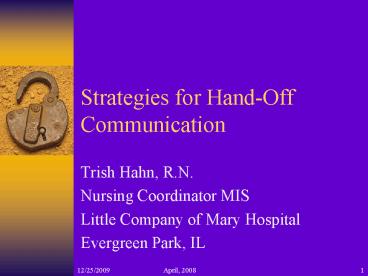Strategies for HandOff Communication - PowerPoint PPT Presentation
1 / 30
Title:
Strategies for HandOff Communication
Description:
Who is, or should be, involved in the communication. What information should be communicated ... Organize the data. Provide cues of important information to pass on ... – PowerPoint PPT presentation
Number of Views:1751
Avg rating:3.0/5.0
Title: Strategies for HandOff Communication
1
Strategies for Hand-Off Communication
- Trish Hahn, R.N.
- Nursing Coordinator MIS
- Little Company of Mary Hospital
- Evergreen Park, IL
2
(No Transcript)
3
Little Company of Mary Hospital
- Non-profit Catholic community hospital providing
the latest surgical, inpatient, and outpatient
facilities. - Opened January 19, 1930 as a four-story 150-bed
hospital. Little Company of Mary Sisters,
supported by 12 staff physicians, made up the
entire staff. - In 1950 three of our staff physicians performed
the first human organ transplant in the world- a
successful kidney transplant that allowed the
patient to enjoy quality of life for the next 4 ½
years.
4
Today
- 325 certified beds
- Over 350 active staff physicians
- Approximately 2,100 employees
- 46,500 Emergency Room visits per year
- Committed to providing Pain Free Health Care
5
MEDITECH MAGIC Site
- MEDITECH customer since 1997
- EDM installed February 2006
- ORM installed February 2007
6
Objectives
- Define Hand-Off Communication
- Identify the five strategies for effective
Hand-Off Communication - Utilization of MEDITECH to facilitate
- Hand-Off Communitcation
7
Hand-Off Communication
- The Joint Commission National Patient Safety Goal
2, requirement E. - Implement a standardized approach to hand
off communications, including an opportunity to
ask and respond to questions.
8
What Does This Mean?
- Health care organizations must define,
communicate to staff, and implement a process in
which information about patient care is
communicated consistently. - Standardization provides a means to educate staff
about the process and helps support consistent
implementation throughout the organization.
9
Methods of Communication
10
Identify the Following
- To which hand-off situation it applies
- Who is, or should be, involved in the
communication - What information should be communicated
- Opportunity to ask and respond to questions
- When to use certain communication techniques,
such as read back or SBAR - What print or electronic information should be
available
11
Barriers to Effective Hand Offs
- Physical setting lack of privacy, interruptions,
- background noise
- Language Differences between people of varying
racial and ethnic backgrounds or geographical
areas - Communication medium limitations of
communication via telephone, e-mail, paper, or
computerized records versus face-to-face
12
Recommended Strategies
- Use clear language
- Incorporate effective communication techniques
- Standardize shift-to-shift and unit-to-unit
reporting - Smooth hand offs between settings
- Use technology to your advantage
13
Clear Language
- Avoid unclear or potentially confusing terms. (ex
Hes doing fine, shes a little confused.) - Do not use abbreviations that could be
misinterpreted.
14
Incorporate Effective Communication Techniques
- Focus on the information being exchanged
- Limit interruptions
- Allow sufficient time
- Use read-back techniques to make sure there is
common understanding - Encourage questions
- Keep report patient centered, avoid irrelevant
details
15
Standardize Shift-to-Shift, Unit-to-Unit Reports
- Implement a consistent format
- Organize the data
- Provide cues of important information to pass on
- Keep the report concise and accurate
16
Smooth Hand Offs Between Settings
- Communicate with the physician when a patient is
admitted, and update him/her whenever the
patients status changes significantly. - Upon discharge, provide the patient with
information about discharge medications,
discharge instructions, follow-up visits. - Follow-up calls to the patient by a health care
professional can often prevent many
post-discharge errors.
17
Use Technology to Your Advantage
- HIS systems that transmit information across
settings and care providers bring consistency and
coordination to care practices. - Electronic medical records can facilitate
transitions by providing consistent, accessible
information about patients and their care.
18
How LCMH Could Achieve This Goal
- Formation of a multidisciplinary Hand-Off
Communication Team - Team evaluated user/department needs
- Evaluated different report practices
- Shift-to-Shift, Unit-to-Unit, Transfer off
campus
19
LCM Strategies
- Face-to-Face shift report using a nursing
profile customized for particular units (ICU,
Med-Surg - Peds.) Set up using the SBAR format.
- Telephone reports when patient goes from ED,
PACU, or Special Procedures. - Worked with the nursing homes and extended care
facilities in our area to design a nursing
profile that is faxed to the nursing home prior
to transfer.
20
Strategies continued
- Customized OE requisitions for central transport,
and numerous ancillary departments - Designed specific PCI query groups and clinical
highlights that enable clinicians to view
pertinent information on one screen
21
SBAR
- Situation
- Background
- Assessment
- Recommendation
22
Situation
- Information every care provider at any level
- would need to know about the patient.
- Examples Admitting Diagnosis, Room,
Location, Code Status, Precautions, Allergies,
Communication Barriers
23
(No Transcript)
24
Background, Assessment, Recommendation
- Shift change reports
- Information provided when transferred to a
- different level of care (ICU to General Floor,
Transfer to Extended Care)
25
Nursing Profiles
- Customize profiles
- Specific to different caregivers
- RN, Care Partner, Physical Therapist
26
Provider to Provider Hand Off
- Group practices
- Coverage for another provider
27
PCI QUERY GROUPS/CLINICAL HIGHLIGHTS
28
(No Transcript)
29
(No Transcript)
30
Questions?































